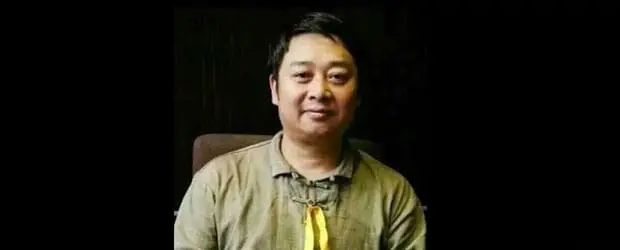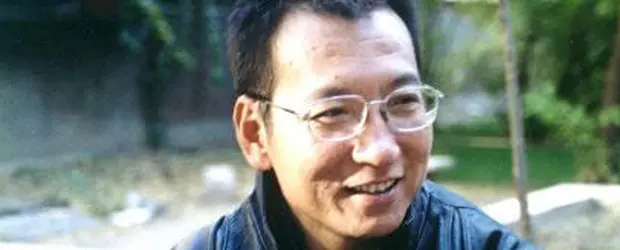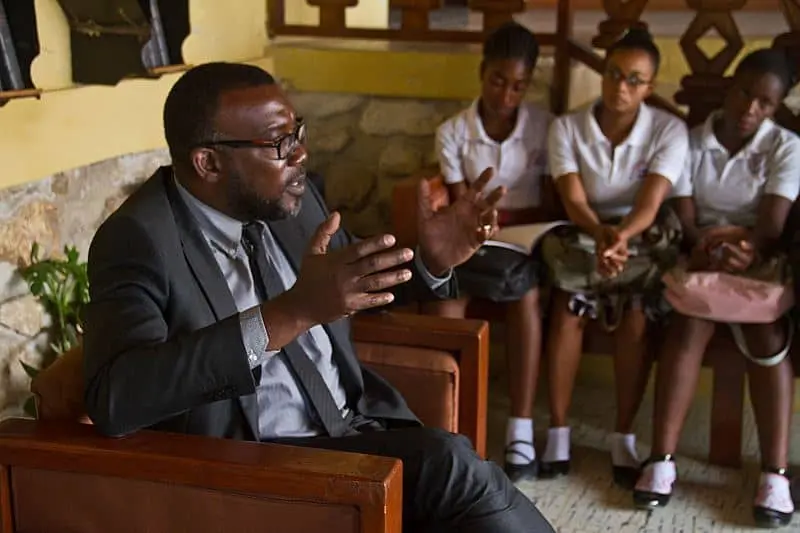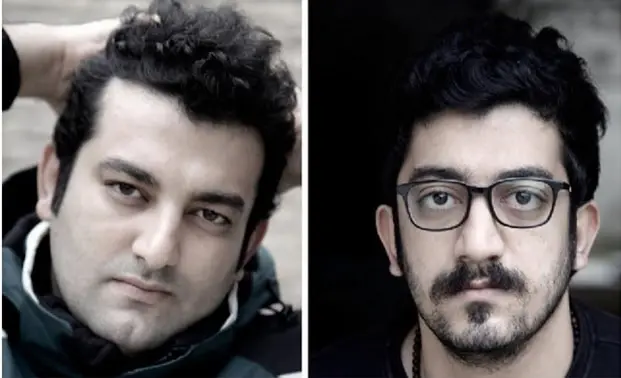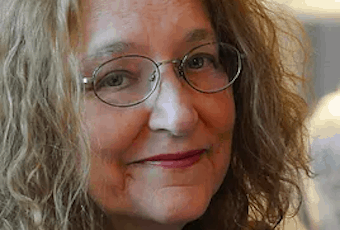 Tess Lewis’s translation of Angel of Oblivion by Maja Haderlap is the winner of the 2017 PEN Translation Prize. The following is an excerpt from the book.
Tess Lewis’s translation of Angel of Oblivion by Maja Haderlap is the winner of the 2017 PEN Translation Prize. The following is an excerpt from the book.
Submissions and nominations for the PEN 2018 Literary Awards are now open and will be accepted through August 15, 2017.
Grandmother signals with her hand, she wants me to follow.
We pass through the smoke kitchen into the larder. Old smoke clings to the vaulted ceiling like dark, greasy resin. It smells of smoked meat and freshly baked bread. An acrid vapor hovers over the feed tub, in which we collect scraps of food for the pigs. The mud floor shines as if polished in the most heavily trafficked areas.
In the larder, Grandmother scoops pork schmaltz from a jar and spreads it around the roasting pan, then with a spoon she scrapes a thin layer of whitish mold off the apple jam and flings it onto the scraps. Malada is written on the labels she has glued onto the jars with a paste made of flour, milk, and spit.
She places a handful of eggs in my skirt, which I hold out for her. Flakes of soot loosened by the draft through the smoke kitchen settle onto the loaves of bread stored propped on their sides on wooden shelves. Under the mouth of the oven near the entrance, ashes have been swept into a small pile.
Grandmother works in the kitchen. The dishes she prepares all taste like the smoke kitchen, like the dark, badly lit grotto we pass through several times each day. It seems to me that everything we eat absorbs the color and smell of the smoke kitchen. The ham and the buckwheat flour, the lard and the jam, even the eggs smell like earth, smoke, and yeasty air.
When she cooks, Grandmother assigns the food specific characteristics. Her dishes have secret powers, they can connect the here and now with the hereafter, heal visible and invisible wounds, they can make you ill
I drink barley coffee from the bottle she keeps hidden for me on the bottom shelf of the sideboard.You’re too big for a bottle, she says, but as long as you want one, I’ll make one for you. I stretch out on the kitchen bench to keep out of sight and suck down the coffee substitute. Much too big, Grandmother repeats. If anyone comes in, put the bottle on the floor immediately.
Grandmother says my mother doesn’t know enough to work in the kitchen. She has no idea how to cook and whatever those nuns taught her in school has no place in our house. She also has no idea that there’s food for the living and food for the dead and that you can heal people or destroy them with specially prepared dishes. But she simply refuses to believe Grandmother.
I, on the other hand, believe every word Grandmother says and enthusiastically turn the crank when she roasts barley for the coffee. I listen as she recounts how many people she used to cook for, back when there were farmhands and farm-maids and lots and lots of children. She tells me she also stole food for herself and the others, she kept an eye out for every single potato peel, for anything that looked edible, back then, when she washed the cauldrons, it was great luck, she says, that she ended up in the kitchen, in the camp. I know.
After washing up she sets the small enamel bowls and pots to dry on the windowsill. She empties the metal tub of dishwater outside. Her long reddened fingers purple from the water. They look like the claws of some bird of prey. Now and then she raps me on the head with them. With a poker she lifts a cast iron lid the size of a plate off the top of the wood stove and spreads the embers so they will cool faster.
As soon as she starts moving, I follow her. She is my queen bee and I am her drone. The scent of her clothes reaches my nose, they smell of milk and smoke with a hint of the bitter herbs hung from her apron. She performs the waggle dance and I prance after her, matching my short steps to her trudging pace. I buzz a gentle melody of questions and she plays the bass.
We go to the sitting room to check on the milk centrifuge behind the door. We spin it a few times a week to separate the cream from the milk. We open the windows in the small adjacent room and air the beds we sleep in, loosen the straw mattresses filled with corn leaves, check and turn the herbs drying on the windowsill or hung on hooks, climb the stairs to the attic, which I find eerie, and look in the garret where ghosts took refuge years ago and chased away all who had slept there, according to Grandmother.
Grandmother continues her dance out the door and binds the yellow kerria to the plum tree in front of the barn. She talks to the elder bush next to the manure pile so it will bloom more quickly. Then she comes back to get me. We cross the courtyard for fodder in the lower basement and the storehouse. She opens flour sacks, chests, and wooden tubs and fills her apron pockets with fresh or dried fruit. She scatters grains of wheat and corn for the chickens. Her forehead is as wrinkled as the shingled roof of the grain silo. She hurries on ahead of me, wants to check the drying kiln near the stream and the frames on which we dry plums and pears in the fall.
Twice a week, she inspects the hen roosts in the tool shed and the barn. If, at the end of the week, there are no eggs in a particular nest, she will look for the bird she suspects is dallying instead of laying. When that hen strays within reach, she pounces on the screeching fowl and sticks her index and middle finger in its behind. If there’s a flash of white between her fingers, she says, the egg will come tomorrow or the day after, the shell is still soft.
Once, to my delight, she pulls an egg out of the chicken and it dis- solves in her hands. I have to laugh. Egg-girl, Grandmother calls me. Grandfather gave me the name, she tells me, when he was lying sick on the bench by the stove and had to watch over me. I was a toddler, not much more than a year old, and had discovered the eggs in the bottom drawer of the sideboard. I let them roll one after another across the wooden floor and as each yolk burst from the shell, I cried, sonči gre, the little sun has come out! Grandfather watched me and was so charmed he let me take all the bowls off the shelves and wouldn’t let Grandmother scold me. As she wiped the scrambled eggs off the floor, he told her she should take pity on me and on him. He died soon after, even though I had kept him entertained.
Only when it comes to kneading does Grandmother appreciate Mother’s help. Then she watches Mother as she stirs the flour. The dough squeaks and squelches in the kneading-trough. Beads of sweat form on my mother’s forehead and drop into the nascent bread. She stands up and wipes the sweat from her face with her upper arm. Her cheeks are flushed, the sleeves of her blouse rolled up, and I can see her undershirt beneath her neckline. She asks about the proportion of rye to wheat flour and of sourdough to water, she’d like to know how many kilos of flour to use. Grandmother says, when the flour covers this notch in the side of the trough, it’s good. Then Mother bends over the dough again. When it begins to loosen from her fingers and no longer squeaks, her work is done. Grandmother cuts a cross into the dough, covers it, and leaves it to rise.
Two hours after Grandmother has fed the two light gray, floury paunches into the oven’s maw, the oven returns the bread. She pulls the piping hot loaves from the oven, wipes them with a cloth, makes the sign of the cross over them and places them in my apron. I carry the bread into the sitting room to cool and slide it onto the table or the wide bench. The smell of freshly baked bread wafts through the house. Grandmother paces through all the rooms as if to make sure that the plumes of sour- dough have reached every corner of the house.
We only had this much bread to eat in the camp, that’s it, Grandmother separates her thumb and index finger slightly to show how thin the pieces of bread allotted to the prisoners were. It had to last for a day, sometimes two. Later, we didn’t even get that much, she says, and so we had to imagine the bread. I look at her. She says, as she always does, je bilo čudno. It was strange, she says although she means it was terrible, but the word grozno doesn’t occur to her.
She stores crumbs and old crusts of bread in her apron pockets. When she crosses the courtyard and goes into the barn, she divides the bread among the animals. She scatters the crumbs in a wide arc for the chickens and stuffs the crusts right in the cows’ and pigs’ mouths. When you’ve got bread you have to remember the animals, Grandmother says, because the bread you share comes back to you.
On All Souls’ Day, she places a loaf of bread and a pitcher of milk on the table for the dead. So they’ll have something to eat when they come at night and will leave us in peace, she says.
I picture the dead eating with invisible hands, but the next morning, nothing seems to have been touched. The knife lies next to the loaf of bread, the milk is still on the table as if undisturbed by even the faintest breeze. Did they come? I ask.Yes, Grandmother answers. She must know, I think,she’s on close terms with Death.After all, she saw him back when he appeared every day and every hour.
Mother works outside. At breakfast I can see her working in the barn. A wicker basket on her back, she hurries over to the threshing floor and then back to the stalls. Her feet firmly planted, she leans over the feeding trough, from which steam rises, and mixes handfuls of cut and sifted hay into the pig slop. When she passes the house carrying tools, she usually comes up to the kitchen window to look for me. She knocks on the windowpane and calls out, where is my kokica, my little chick. Sometimes she just winks and leaves without a word.
She wears brighter aprons than Grandmother and loves to sing while she works.
Following the direction her singing comes from, I can figure out where she is at any given time. If she’s in a cheerful mood, she lures me outdoors with pet names she also uses for the animals and gives me a chore to do or hugs me tightly. Her caresses are rough. She reaches for me the way Grandmother grabs at the chickens and pulls me close. She tickles and bites me when I try to get away. Whenever she’s feeling dejected, she won’t let me near her. Her sorrow has a magnetic attraction for me. In such moments, I want to climb over her like a cat in a tree and look down, from the top of her head, into her eyes, to lick her cheeks, to rub her nose a bit and sink my claws into her back should she ever try to shake me off. Mother certainly has no sympathy for my desires. As soon as I touch her hip, she pushes me away like a mother animal her young and asks when I might be planning to do the chore she assigned me. Now, I say, hoping Grandmother has heard everything and will take over my duties, which she gladly does, if only to annoy Mother.
Sometimes I find Mother crying in her and my father’s bedroom. At those times she sits on the bed with her rubber boots still on her feet. She doesn’t like it when I surprise her in this state. What are you looking for, she asks. You, I answer, you! Her despair must be very great because her rubber boots and her stained apron don’t go at all with the light linen bedspread embroidered with colorful flowers spread over the marriage bed.
On mild evenings she sits in the meadow behind the house and looks at the sky or leans against the wooden balcony on the south side of the outbuilding where no one can see her. One day she is kneeling in the entrance hall in front of a refrigerator that has just been delivered.What’s the point of that gadget, Grandmother rails in the kitchen, it only costs money. Mother wipes the refrigerator with a soft rag she keeps dipping into a washbowl of hot water and wringing out again. Every house- hold needs a refrigerator like this nowadays, she answers stubbornly. Nonsense, Grandmother replies, she’s never owned a refrigerator, no one needs such a gadget.
One evening Mother hangs two small, framed pictures of angels over my bed in the room I share with Grandmother. After my brother came, I stopped sleeping in the outbuilding with my parents and moved into Grandmother’s room, which I’m happy about because she is the pillar of my childhood. As she hammers two small nails into the wall for the pictures, Mother says she’s brought me two guardian angels to watch over me. This young man with curly blond hair and wings growing out of his back is supposed to protect me. He’s a careless young man, I decide, since he wears impractical open-toed sandals as he leads two children over a suspension bridge; a deep mountain canyon yawns below. Mother recites the prayer sveti angel varuh moj, bodi vedno ti z menoj, stoj mi dan in nočob strani, vsega hudega me brani, amen with me and tells me that angels can see into a person’s soul and read their most secret thoughts.
I look skeptically at the well-fed, chubby-cheeked beings because I don’t believe my thoughts are there to be spied on and because I’m worried the angels are too naive and inexperienced to protect me. Their dreamy, misty-eyed gaze is directed at the heavens and, while half-naked, the few clothes they do wear seem expensive. They play the strangest instruments and are at home in the clouds, not on earth. I ask myself if these winged creatures really want to know everything and see all I’d rather keep secret.Although I do like the singing girlish boys and would like to see swarms of them perching on church altars and frescos like swallows on electric lines in late summer, they make me uneasy.
One morning when I get up, it strikes me that my father must have fallen from heaven or from a bridge. He’s lying on the kitchen floor, his face covered with blood. Grandmother slides a pillow under his head and covers him with a woolen blanket. Mother has placed a washbasin filled with cold water next to him. She wants to wipe the blood off his cheeks but he raises his hand defensively.
We can’t just leave him lying here, Mother says in a strained voice.
Leave him alone, if that’s what he wants, Grandmother orders and pushes Mother aside.
When Father notices me huddled against the stove in distress, he smiles. A small stream of blood gushes from his mouth and rolls down his cheek and seeps into his light shirt collar.
He’s lost his teeth, Mother wails and bolts out of the kitchen. She stops outside the door and plucks at the flowers that are just beginning to bloom in the window boxes. What happened, I want to know. Father fell off his motorcycle, Mother sobs, we have to call the doctor. Then she runs off.
Father is driven to the doctor that afternoon. A neighbor picks him up in his car.
He’s had lots of guardian angels, Mother says. Did the angels cushion the motorcycle’s fall, I wonder, or did they wake the neighbor who found him lying in the field and helped him get up? I need to rethink the whole angel situation, I decide, maybe they’re not as useless as I thought.
This is an excerpt from Tess Lewis’s translation of Maja Haderlap’s Angel of Oblivion, published by Archipelaho Books in 2016.


